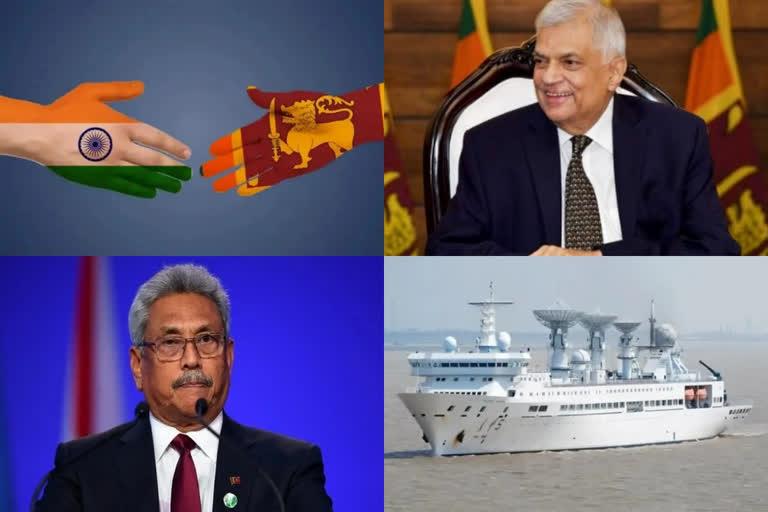Colombo: Sri Lanka was hit by an unprecedented financial crisis in 2022 that also sparked political turmoil in the island nation that led to the ouster of the all-powerful Rajapaksa family for now. The resignations by President Gotabaya Rajapaksa in July and his elder brother Prime Minister Mahinda Rajapaksa in May amidst massive anti-government protests subsided with the formation of a government led by their ally Ranil Wickremesinghe, who is now tasked with stabilising the economy and restoring the financial health of the economy, already hit badly by the pandemic.
From April to July, chaos reigned on the island nation with miles-long queues forming at fuel stations and irate residents coming out in thousands blocking roads with empty cooking gas cylinders. Over 20 people died in the serpentine fuel queues due to exhaustion in long lines and in certain cases the waiting period extending over 72 hours.
In April, President Gotabaya Rajapaksa fired his brother and Finance Minister Basil Rajapaksa when the country started to feel the heat of the looming economic turmoil. The Sri Lankan government in May declared a debt default on over USD 51 billion in the foreign loan - a first in the country's history. Extending a much-needed lifeline to a neighbour in need, India gave financial assistance of nearly USD 4 billion to Colombo during the year.
In January, India announced a USD 900 million loan to Sri Lanka to build up its depleted foreign reserves as the financial crisis began to unfold. Later, it offered a USD 500 million credit line to Sri Lanka to fund the country's fuel purchases. The credit line was later expanded to USD 700 million due to the sheer gravity of the situation. A chronic shortage of foreign currency and soaring inflation have led to a severe shortage of medicines, fuel, and other essentials.
The debt default came as public protests raged in April over the then President Gotabaya Rajapaksa's government's mishandling of the country's economic crisis, the worst since its independence in 1948. Hundreds of thousands of people from all walks of life and all communities took part in the largely peaceful protests demanding the resignation of President Rajapaksa and his elder brother Mahinda Rajapaksa, the then-prime minister who quit in May.
External Affairs Minister S Jaishankar was the first foreign dignitary to visit the island in the midst of unprecedented chaos. "Sri Lanka is our closest neighbour. It is our pleasure to extend our goodwill to help you, people," Jaishankar said in March. India also asked the International Monetary Fund (IMF) to urgently provide financial assistance to Sri Lanka. Gotabaya Rajapaksa's government was under scrutiny for ignoring the option of going to the IMF when it seemed that the nation's pandemic-hit economy needed a bailout.
Sri Lanka's economy has completely collapsed, then Prime Minister Wickremesinghe said in June. In June, India sent four senior government officials to Colombo to assess the economic crisis in the country. "India has stretched themselves maximum by offering 4 billion dollars worth of assistance. This is no charity, Sri Lanka has to find ways to help ourselves and pay back India," Wickremesinghe told Parliament.
In July, thousands of people stormed Gotabaya Rajapaksa's official residence, forcing the disgraced president to flee on a military plane first to the Maldives and then to Singapore, from where he sent his resignation. His resignation led to the end of the rule by the powerful Rajapaksa clan, which wielded power for nearly 20 years.
That paved the way for veteran politician Wickremesinghe, also an ally of the Rajapaksa family, to become a stop-gap president. President Wickremesinghe then appointed Dinesh Gunawardena as the new Prime Minister. India has underlined that it does not interfere in the internal affairs and democratic processes of another country while terming as "baseless" and "purely speculative" the reports on influencing Sri Lankan leaders at the political level in the presidential election in the island nation.
The docking of a Chinese spy ship at Sri Lanka's Hambantota port in August triggered a diplomatic row between New Delhi and Colombo. The port call by the high-tech surveillance ship also led to a Twitter spat between the Indian and Chinese diplomatic missions here. Wickremesinghe in August said Sri Lanka's economic woes would last for another year and it will have to think outside the box and look at new sectors such as logistics and nuclear energy to revive the bankrupt economy.
Sri Lanka and the IMF agreed on a staff-level agreement to release USD 2.9 billion over 4 years. But the much-anticipated IMF bailout will have to wait till early next year as the country pursues talks with creditors to meet the global lender's condition for the facility. President Wickremesinghe recently said that India and Sri Lanka held "successful" talks on debt restructuring and the country will also begin discussions with China, as it scrambles to get assurances from major bilateral creditors to close the crucial deal with the IMF.
He will have some tough decisions but the Sri Lankans are not by his side. They blame him for rescuing the Rajapaksas who had brought economic misery through mismanagement and corruption. Many argue that Wickremesinghe sits on a volcano that could erupt at any time. (PTI)



